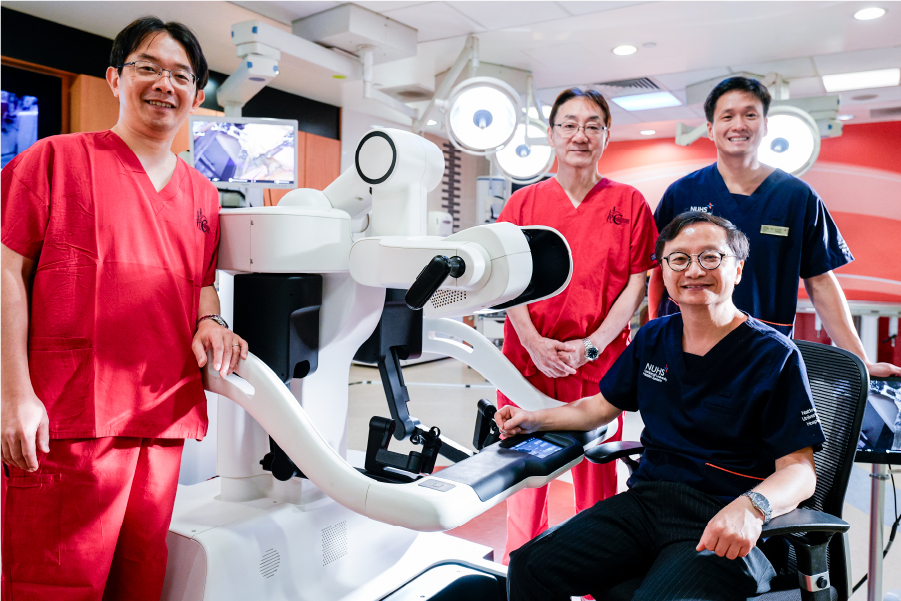NUH clinician-scientists and Japanese experts are edging remote surgeries
closer to reality, broadening access to specialised care in underserved regions.
Issue 3 | December 2023

 Subscribe and ensure you don't miss the next issue!
Subscribe and ensure you don't miss the next issue!
Expertly manoeuvring advanced robotic arms to perform precise surgery from thousands of kilometres away may sound like the stuff of science fiction. In a recent collaborative endeavour between Singapore's National University Hospital (NUH), the Yong Loo Lin School of Medicine at the National University of Singapore (NUS Medicine), and Fujita Health University (FHU) in Japan, this futuristic vision is nudging closer to the present.
The preclinical trial conducted in October 2023 involved a series of complex gastrectomy procedures. It represents not just a significant stride forward in the complex business of robotic tele-surgery, but also a step towards amplifying healthcare accessibility within the region. This could mean a future where geographical distances no longer dictate patients' access to surgical expertise.
Oceans apart, bridged by technology
The trial aims to identify, elucidate and address potential hurdles inherent in remote surgical operations. Spearheading the Singaporean team in this trial were Professor Jimmy So from the Department of Surgery, NUS Medicine, and Head and Senior Consultant in the Division of General Surgery (Upper Gastrointestinal Surgery), Department of Surgery, NUH, and Assistant Professor Kim Guowei from the same departments in NUS Medicine and NUH.
Over 5,000 kilometres away, their counterparts, Professor Ichiro Uyama and Professor Koichi Suda from FHU, brought expansive expertise in robotic surgery to the table, deploying Japan's first surgical robot.
Operating from a surgeon cockpit in Singapore, Prof So and Asst Prof Kim remotely performed a gastrectomy on a simulated organ in Japan. Every meticulous movement was transmitted, directed and replicated by a robotic operation unit, all facilitated through a dedicated international fibre-optic network.
"This exercise is a leap toward a fresh surgical paradigm and extends the scope of what is possible in delivering specialised care, especially in areas where certain surgical expertise is scant," says Prof So.
Going the distance
The benefits stemming from this proof-of-concept demonstration are manifold. The potential for actual robotic tele-surgeries in the near horizon could mean patients no longer need to traverse long distances for specialised surgical care.
"Remote tele-surgery can serve as a crucial component in a healthcare framework that broadens global access to expert care, which is a boon for underserved regions," adds Prof So. "It is also emerging as an indispensable tool for delivering timely medical interventions amidst emergencies or global crises - a reality starkly underscored by the recent COVID-19 pandemic."
Echoing Prof So's sentiments, Asst Prof Kim sees this collaborative project as a conduit for continuous learning and improvement. "Working alongside our Japanese colleagues not only enriches our understanding of the field but also furthers the frontier of tele-surgery, which in turn, holds promise for both patients and the broader medical community," he says.
Like this article? Simply subscribe to make sure you don't miss the next issue of EnvisioningHealth!




















